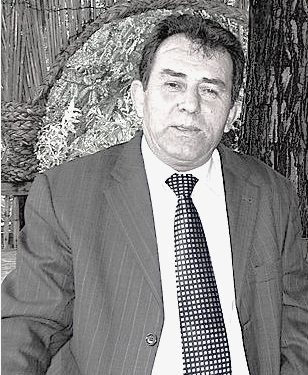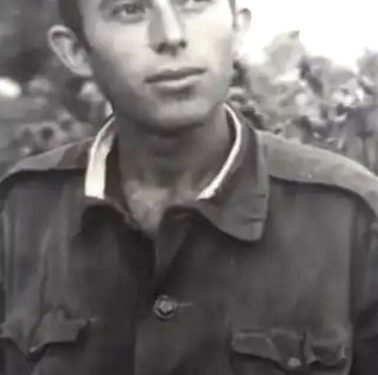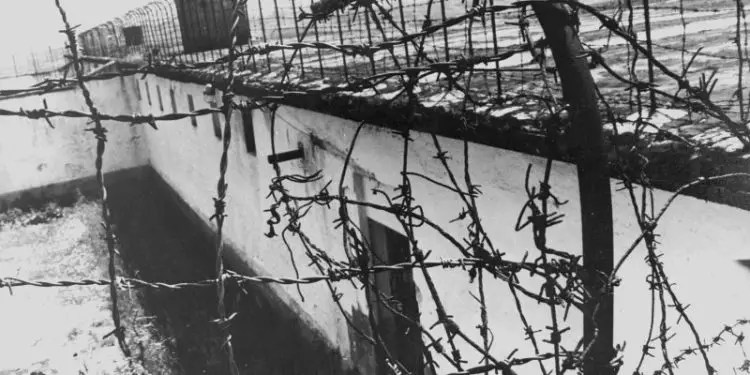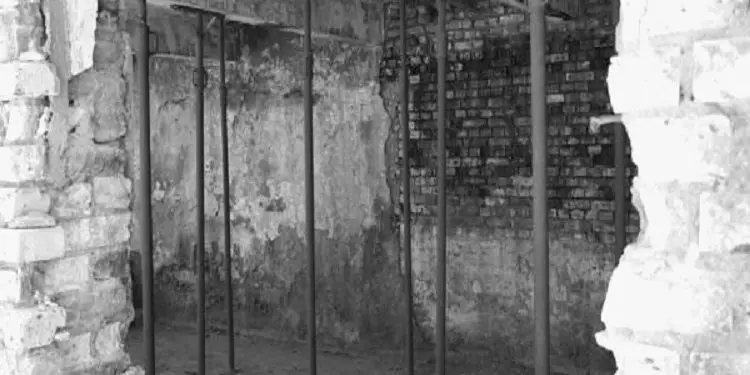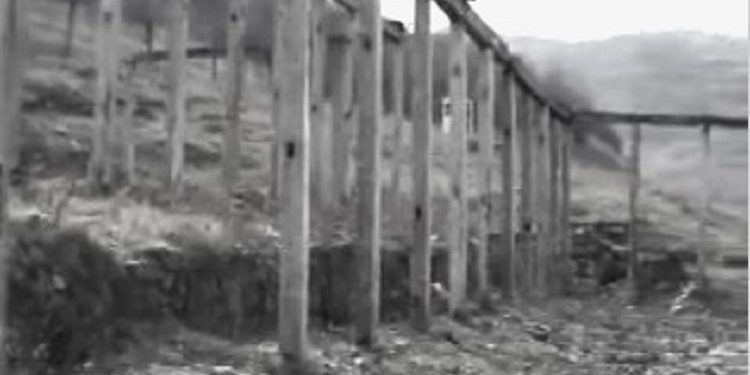By Shkëlqim Abazi
Part thirty-six
Memorie.al / I were born on 12. 23. 1951, in the black month, of the time of mourning, under the blackest communist regime. On September 23, 1968, the sadistic chief investigator, Llambi Gegeni, the ruthless investigator Shyqyri Çoku, and the cruel prosecutor, Thoma Tutulani, brutalized me at the Branch of Internal Affairs in Shkodër, they split my head, blinded one eye, deafened one ear, after breaking several ribs, half of my molar teeth, and the thumb of my left hand. On October 23, 1968, they took me to court, where the pitiful Faik Minarolli gave me a ten-year political prison sentence. After half of the sentence was cut, because I was still a minor, sixteen years old, on November 23, 1968, they sent me to the political camp of Reps, and from there, on September 23, 1970, to the Spaçi camp, where on May 23, 1973, during the revolt of the political prisoners, four martyrs were condemned to death and executed by firing squad: Pal Zefi, Skënder Daja, Hajri Pashaj, and Dervish Bejko.
On June 23, 2013, the Democratic Party lost the elections, a process more than normal in the democracy we aspire to. But on October 23, 2013, the General Director of the “Renaissance” government sent Order No. 2203, dated 10.23.2013, for the release from duty of a police officer. Thus, Divine Providence was interwoven with the Neo-communist “Renaissance” Providence and, precisely on the 23rd; I was replaced by, no less and no more, but the former Security operative of the Burrel Prison. What could be more significant than that?! The former political prisoner is replaced by the former persecutor!
The Author
SHKËLQIM ABAZI
R E P S I
(Forced Labor Camp)
Memoirs
“I got rid of the cell scum! I thanked Bajram from the bottom of my heart, that short man, a man of few words but much work, who did for others what he never did for himself, then I headed for my sleeping spot, where I hadn’t stretched out for a month. I climbed the wooden stairs and sat among my bunkmates. When I found myself there, a special feeling of contentment seized my soul. It felt like I had returned home, after a long and tiring exile! ‘How strange a person transforms! Even that seventy-centimeter territory, where they had caged us by force, one would consider it property, even when it didn’t belong to the individual but to the camp command! And even the two neighbors, unknown until yesterday, one would see as family members’?”
“I was pondering these thoughts at that moment, but I didn’t have time to delve deeper because acquaintances and strangers were approaching, shaking my hand, giving me a ‘get well soon’ or ‘it’s over’ according to the dialect, and leaving to make way for others. I, who didn’t expect this much commotion, extended my hand mechanically, saw off the first one with a ‘may your honor increase’ (tu rrit ndera) and waited for the next. I couldn’t believe that in such a short time I had become so well-known! But I had been wrong; the endless line of elderly or sick visitors, whose names I didn’t even know, forced me to change my mind.”
“Locked in the cell, I thought that in a month, even those I had worked with would forget me, let alone others! But events had flowed differently. In the camp, my gesture had been given the strangest colors. It had been brought up and conveyed, judged and over-judged, spun long in conversation after conversation, and in the end, the effect this news had produced had taken a sense completely opposite to what the command aimed for; that is, to intimidate the other young people through terror. Because the healthy part took this gesture as a positive example, they served it to the newcomers as the best way to act, when they found themselves in the same conditions or under the pressure of the spies and immoral people introduced by the operative. But there were also those who considered this action an extreme, excessive, almost insane reaction. Nevertheless, in interpretations, the positive opinion prevailed.”
The Legend of the ‘Qyrek’ (Bed-Board)
“As my friends would convince me, and also from the experience of the years that followed, this gesture was done at the right time, in the right place, and against the right person, whom public opinion considered the typical exponent of evil in the camps. The lesson Sali Nela received would be remembered for a long time in prison life and would serve as a well-deserved example for his kind in vice. No one among them would dare to attack the young people again. The phrase ‘the qyrek is waiting for your head’ or ‘there’s the qyrek!’ became new additions to the prison jargon. In fact, a hunched-over old man whom I was seeing for the first time, when he visited me after the dungeon, wished me with a somewhat strange expression: – ‘May the qyrek live long for you, and may it have a long life!’ Uncle Sherefi, who was always ready to turn every word into a joke, teased him: – ‘Gole, should the fool or the qyrek live long for us?’ – ‘Well, the qyrek is the remedy, because the boy is young and has life ahead of him!’ – The cheerful old man replied. Thus, for a month the event had simmered in the gossip kettle of the prison. Thanks to the propaganda led by my elders, and the authoritative word of Dom Mark, through the information of those who entered and exited the dungeons during that month and who had also reported on my attitude there, I had become famous for no reason at all, without any intention of becoming so! Radio-Prison (Radio-burgu), which never stopped spreading news throughout the universe of Albania’s prison-city (burgograd), had transmitted this fame almost everywhere where there were political prisoners.”
“This case had surpassed the orbit of the political prisoners’ barbed wires and had also entered the ordinary camps’ enclosures. The unusual transmission, with unusual means, had clothed the event with unusual properties. Years later, after my release from prison, when I was doing my military service in a labor unit in Shkodër, a group of laborers, while playing gambling, had a bad quarrel with each other; one of them grabbed the qyrek (bed-board) and demonstrated it as a weapon that could be used for defense, but also to bring justice. This became the reason for several former ordinary convicts, who were part of the game, to mention the story of the ‘qyrek‘ which they held close to their hearts. Of course, wrapped in the veil of mystery, as legends are, they had distorted it.”
“Among the crowd, there was also a former fellow prisoner of mine; as soon as he heard the ‘qyrek‘ mentioned, he gave me a meaningful look. When tempers cooled and the players quietly resumed the game, my fellow prisoner told me the story of the ‘qyrek.’ Unintentionally, I had been placed in the center of attention, which made me extremely uncomfortable. When the attendees realized that the person being talked about was me, no one wanted to believe it, because the gossip and Radio-Prison had transformed me, they had clothed me with muscles and had cast my delicate figure under a gigantic appearance. The original they had before their eyes disappointed them, as they weren’t seeing the ‘Hercules’ they had supposed.”
“Regardless of how I paid for it, the gesture and the judgments around it served me greatly in the remaining years of prison. No one attempted to provoke me a second time, or to even utter a single word to me. The fact that a mere ‘qyrek‘ had turned me into a VIP – back then they called them a garip (a strange, notable person) – protected me. Even though I never felt that way, I spent the years in prison as a garip. After the greetings were over and the crowd had left, I remained alone with the elders and neighbors. Bajram gathered the clothes they had sent me to the dungeon on the first day, tied them in a bundle, and left to scald them with lye.”
– “I’ll wash them so we can return them to those we borrowed them from!” – “Who are they?” – I asked curiously. I wanted to know them, to express my gratitude for the sacrifice they made for me. – “And what do you need to know who they are for?” – Uncle Sherefi cut me off. – “Simply, to thank them!” – I replied. – “We thanked them! Isn’t that enough for you!” – he kept it short. – “Please Bajram, thank them once more on my behalf!” – I addressed my compatriot. – “Don’t worry, I will, after I wash them!” – He assured me. Anyway, I thanked everyone who stood by me in that plight once again to myself, just as I continue to thank them incessantly even today: “I thank you without exception, acquaintances and strangers, for everything you did for me in those moments of misery! I will not forget you as long as I breathe!”
The Nightmare of the Cell
“The one-month stay in the cell had exhausted me. After the shower and the little food my friends brought me, I felt weak. My eyelids grew heavy, and a confusing sleep overcame me. Vaska, who noticed that my eyes were closing, seemed to have signaled the others, because I saw the elders leaving one after another, in silence. He himself moved aside and threw a woolen blanket over my shoulders. After a month without resting my ribs on the bunk, my aching bones fell into comfort and…! I slept… I plunged into a half-sleep, phantasmagorical. Before my eyes appeared some strange figures, with some twisted and cross-eyed faces, each one uglier than the last. One opened his mouth like a cave and grinned, another screamed near my ear with some infernal shouts, as loud as his throat could produce, still others jumped and twisted in a grotesque dance, worthy of the offspring of HELL. The ghosts emerged from nothing, dressed in multi-colored garments; white, black, yellow, red, which they constantly changed, until they ended up in guard uniforms; they took turns dancing, replacing each other. ‘Oh God, how terrifying is this dance of ghosts’?”
“At one point, a shadow broke away from the line and shrieked at me, tearing my eardrum: ‘Hey you did you like the rent-free hotel!’ While another followed: – ‘Still sleeping, you imbecile?! Do you want a bucket of water on your head, huh?!’ Was I asleep? Or dreaming? Only God knows! I instantly jumped up terrified, casting my half-closed eyes towards where the voice seemed to come from. I looked for the bucket of water. Nothing. Twilight. The barracks spun around me. I lowered my hand to my thigh and pinched myself, until my flesh hurt. I sobered up. In the middle of the corridor, a policeman was shouting at the top of his voice: – ‘Hey you, wasn’t one month enough, huh? Quick, to roll call! Or do you want more, hey you!’ – The last threat whistled at me like a snake. ‘I wasn’t dreaming, the dizziness must have blurred my eyes!’ At that moment, Uncle Sherefi grabbed me by the arm so I wouldn’t fall to the ground: – ‘Easy, you fool!’ I regained my senses, descended the stairs, and went out into the square, where I felt the rush of the Mirdita cold hit me. It was still early, the workers hadn’t returned from work. It was the roll call for the six hundred men. Usually, just before the others entered the camp, they counted those who were there, so as not to repeat it twice; not that they felt pity for the ‘enemies’ of the regime, on the contrary, but they didn’t want to create extra trouble for themselves in this winter cold.”
The Kindness of Fellow Prisoners and the Professor’s Words
“When the counting was over, the crier called out for the distribution of the food. I didn’t bother to go to the kettle to get that disgusting leek slop without a drop of fat; not that I wasn’t hungry, but simply I was exhausted. So, quickly back to the bunk, where I lay down again. But this time I covered myself with a quilt and blankets and, without further ado, plunged into deep oblivion. The phantasmagorical world of dreams disappeared; Lethe set its smoky sails. I woke up at some point. Outside over the hills of Reps, complete darkness. How long had I slept? I don’t know! A lot? Maybe! How many hours must have passed since leaving the cell? An eternity! I had no idea, the concept of time was badly skewed for me. Maybe it was very late. ‘Am I still in the dungeon and don’t realize where I am’?! I was disoriented. ‘Eh, what the cell does to you! The cell… the cell’?”
“It was a heavy punishment, not only because it caused physical damage, but it mainly destroyed you psychologically. I’ve known many punished people who, when they came out of isolation, even after a month or more, wandered around the camp aimlessly, like a blind wolf. They felt so dizzy that they often lost their memory; instead of heading to their barracks, they ended up somewhere else and it had happened that they lay down in foreign bunks, with the presumption that they were in their own. The dazed ones in the camps were teased with the expression: ‘You’re confused, as if you’ve just come out of the cell,’ and this was not without basis.”
“I also plunged into the syndrome of this phenomenon, of course not to the extent of confusing the barracks or the bed, but at certain moments, I wandered aimlessly in the square, or started to go to the latrines, and ended up in the private kitchen, without a specific purpose, and when I realized the mistake, I laughed at myself: ‘You’re confused, Çim my boy!’ then after shaking my head, I returned to where I had started. And this didn’t happen to me only once. The confusions of this nature and those I observed in others made me reflect: ‘I must find the best possible way to avoid useless punishments. – What if they catch you? – My alter-ego asked me. – If they catch me? Well, what can I do, I will resist!’ – I replied. Anyway, I suggested this idiom to myself that frosty morning, which in any case was not easy for me to put into practice, due to the circumstances imposed by the environment and which did not depend on my will. But from the provocations of others, the humor of the policemen, and the harassment of the spies, which the camp operative recruited.”
The narrative continues with a conversation about hunger in the context of the communist system, led by the ‘Professor’:
“When the professor took the floor, I was stunned: – ‘No one has the right to judge a hungry person without knowing hunger oneself!’ – That’s how he started. ‘Hunger darkens even the brightest minds! It makes the wise ferocious, it calms the ferocious! Hunger breeds misery, ignorance, crime, prostitution, degeneration. But above all, it produces a generation of amorphous people, with a stunted personality. An empty belly also empties the brain! Hunger has always existed as a social phenomenon, from antiquity to the present day. With its bogeyman, they have speculated in every era. Materialist philosophers, as unscrupulous demagogues, have exploited and still exploit this malignant social phenomenon, to incite violent revolutions, to overthrow political systems.’ Memorie.al”




